Description
OZONE GEO 7 Paraglider – Soar Lighter, Fly Further
The OZONE GEO 7 Paraglider isn’t just a wing—it’s a revolution for hike-and-fly adventurers seeking the lightest EN B performance available. Whether you’re exploring remote alpine ridgelines or embarking on vol-biv expeditions, the GEO 7 stands as your ultimate ultralight companion. Blending cutting-edge design with uncompromising safety and exceptional performance, it offers a new level of freedom for ambitious pilots.OZONE GEO
Why Choose the OZONE GEO 7?
A New Era of Lightweight Performance
OZONE continues to redefine the standard for lightweight wings. The GEO 7 takes the legacy of its predecessors and advances every detail. It’s not merely lighter—it’s more refined, more responsive, and more efficient. By incorporating innovations from the Buzz Z7 and the ultralight OZONE R&D lineage, the GEO 7 delivers improved glide, climb, and handling, all while shedding unnecessary grams.
Tailored for Adventure Pilots
Designed specifically for hike-and-fly, vol-bivouac, and cross-country exploration, the GEO 7 is ideal for pilots who prioritize weight savings without compromising comfort, safety, or fun. If your heart beats for untamed peaks and long, scenic descents, this paraglider answers your call.
Key Features of the OZONE GEO 7 Paraglider
Ultra-Light Yet Robust
Though it tips the scales at a mere fraction of a standard wing’s weight, the GEO 7 sacrifices nothing in durability or flight feel. Crafted with Porcher Skytex 27 Classic II and a 20D trailing edge, it offers the ideal blend of resilience and lightness.
OZONE GEO Class-Leading EN B Safety
Certified at EN B, the GEO 7 is accessible, forgiving, and reassuring in turbulence. New pilots entering the sport and seasoned flyers seeking peace of mind during long hikes or bivouac adventures can both rely on its dependable behavior.
OZONE GEO Inspired Handling with Enhanced Precision
Thanks to an evolved arc and tension-controlled internal structure, the GEO 7 delivers precise brake response and stable turns. Despite being lightweight, it offers excellent pitch control, even in rough thermals.
Effortless Inflation and Takeoff
The launch characteristics are smooth and consistent—even in nil wind or tricky conditions. The GEO 7 rises symmetrically, requiring minimal effort, which is crucial when launching from restricted or awkward mountain spots.
Technical Highlights – Engineering at Its Best
New Internal Architecture
OZONE’s design team has optimized the line layout, internal structure, and diagonal rib patterning. These updates increase the wing’s overall solidity in active air and reduce parasitic drag.mini wings
OZONE GEO Reduced Line Drag
Line consumption has been minimized across the span. The result? A better glide ratio and cleaner airflow, especially crucial on long transitions or when pushing against valley winds.mini wings
Performance-Boosting Airfoil
Borrowing elements from OZONE’s high-end performance wings, the GEO 7’s airfoil promotes excellent thermalling and efficient transitions. Expect smoother pitch behavior and enhanced performance over long distances.mini wings
OZONE GEO Size Guide – Find Your Perfect Fit
Selecting the right size is vital for optimizing performance and safety. The GEO 7 offers five sizes, covering a wide range of takeoff weights:
| Size | Flat Area (m²) | All-Up Weight (kg) | Glider Weight (kg) |
|---|---|---|---|
| XS | 22.8 | 55 – 70 | ~3.17 |
| S | 24.4 | 65 – 85 | ~3.32 |
| M | 26.0 | 80 – 100 | ~3.49 |
| L | 28.0 | 95 – 115 | ~3.68 |
| XL | 30.0 | 110 – 130 | ~3.92 |
Tip: When in doubt between sizes, consider your hike-and-fly loadout and choose the size that places you in the middle of the weight range.OZONE GEO
Product Highlights – What Makes the GEO 7 Special?
-
✅ Ultra-Light Construction: Starting at just 3.17 kg
-
✅ EN B Certification: Perfect for intermediate and adventure pilots
-
✅ Exceptional Thermalling: Responsive and floaty in climbs
-
✅ Hike-and-Fly Ready: Compact pack volume, featherweight handling
-
✅ Effortless Launch: Outstanding inflation characteristics
-
✅ Improved Line Layout: Cleaner profile and better glide
-
✅ Durable Fabric Mix: Skytex 27/20D offers strength and lightness
-
✅ Riser Options: Available in standard or ultralight versions
-
✅ Minimal Pack Volume: Packs easily for backcountry travel
-
✅ Inclusive Sizing: Covers a wide range of pilot weights
Comparing the GEO 7 to Its Predecessor – GEO 6
| Feature | GEO 6 | GEO 7 |
|---|---|---|
| Weight | 3.5 – 4.1 kg | 3.17 – 3.92 kg |
| Performance | Solid XC performance | Enhanced glide and climb efficiency |
| Launch Behavior | Easy | Even smoother and more intuitive |
| Fabric | Skytex 27/32 Mix | Optimized Skytex 27 with 20D TE fabric |
| Handling | Stable, responsive | Sharper brake feel with more agility |
| Certification | EN B | EN B |
In summary: The GEO 7 outperforms the GEO 6 in every measurable way—lighter, more responsive, and easier to launch in varied conditions.
Comparison with the Buzz Z7 – Adventure or Versatility?
While the Buzz Z7 shares the same EN B classification, it is geared more toward beginner and intermediate pilots seeking a traditional wing for all-round flying. The GEO 7, on the other hand, appeals directly to adventure seekers and hike-and-fly enthusiasts who demand:
-
Lightweight gear without compromise
-
Compactness for backcountry use
-
Slightly higher pilot engagement and performance
Mastering the OZONE GEO 7 – Tips for Use
1. Pre-Flight Ritual
-
Lay out the wing facing into wind
-
Check lines and risers for tangles
-
Attach leg straps, chest strap, and helmet
-
Perform a control line check
2. Ideal Conditions
-
Best flown in moderate thermic conditions
-
Excels in alpine and hike-and-fly environments
-
Avoid excessively turbulent sites for smoother flights
3. Launch Technique
-
Use the “A-riser” method for forward inflation
-
In nil wind, adopt a strong, purposeful run
-
In stronger conditions, use a reverse launch technique
4. Thermal Climbing Strategy
-
Enter thermals with coordinated brake input
-
Stay near the core but adjust your turn size to match lift intensity
-
Allow the GEO 7’s pitch stability to do much of the work for you
Who Is the GEO 7 For?
This wing fits an exciting niche in the paragliding world. It’s:
-
Ideal for intermediate pilots looking to explore adventure flying
-
Suitable for experienced beginners with mountain launching knowledge
-
A perfect second wing for XC pilots who hike for altitude gain
-
A great match for vol-biv enthusiasts needing compact, reliable gear
Frequently Asked Questions (FAQ)
Q: Can beginners fly the OZONE GEO 7?
A: Yes, if they are progressing confidently from a school wing. It’s certified EN B and offers high passive safety, but beginners should ideally get guidance from an instructor before stepping into lightweight flying.
Q: What is the life expectancy of the GEO 7’s lightweight materials?
A: OZONE has chosen the most durable ultralight materials available. With proper care—avoiding UV exposure and harsh landings—it can last as long as a standard wing.
Q: Does the GEO 7 come with light risers by default?
A: You can choose between standard risers or ultralight risers at the time of purchase. The ultralight risers shave additional weight and are preferred for hike-and-fly.
Q: How does it pack compared to other wings?
A: Due to its fabric and construction, the GEO 7 packs extremely compact, making it ideal for long treks or tight packing situations.
Q: Is this wing suitable for tandem or heavy loads?
A: No, the GEO 7 is a solo wing with max weight recommendations. For tandem flights, refer to OZONE’s tandem-specific offerings.
mini wings Care and Maintenance Guidelines
-
Store in a cool, dry place away from sunlight
-
Avoid folding or packing when the wing is wet
-
Use a concertina bag for long-term storage
-
Inspect lines, risers, and sail regularly
-
Get an annual check from a certified service center
What Pilots Are Saying
“I used the GEO 7 on a three-day vol-biv and couldn’t believe how light it felt in the pack—and how much energy I saved on climbs!”
— Jenna M., Alpine Expeditionist
“I’m amazed at how stable and intuitive the wing is in rough air. It gives me confidence while still being playful in thermals.”
— Leo R., Cross-Country Pilot
Final Verdict – Is the OZONE GEO 7 Worth It?
Undoubtedly, yes. The OZONE GEO 7 Paraglider strikes an extraordinary balance between lightness, comfort, and performance. Whether you’re chasing distant summits or carving smooth lines through thermals, this wing rewards your every decision. It’s a culmination of OZONE’s passion for excellence, tuned for those who seek freedom in the sky and lightness on the trail.
Elevate Every Flight with the OZONE GEO 7 Paraglider
The OZONE GEO 7 Paraglider redefines the balance between lightweight construction and high-performance capability. Because every gram matters, especially on long hikes and technical takeoffs, this wing delivers exceptional versatility. Consequently, whether you’re an adventurous hike-and-fly pilot or a weekend thermal chaser, the GEO 7 empowers your journey like never before.
Ultra-Lightweight Design Without Compromise
First and foremost, the GEO 7 is significantly lighter than its predecessors. In fact, thanks to cutting-edge materials and streamlined construction techniques, the GEO 7 shaves off grams while maintaining impressive durability. Additionally, its packability ensures you’ll spend less energy on the way up—so you can soar longer and further on the way down.
Responsive Handling & Smooth Performance
Furthermore, OZONE’s signature SharkNose technology combined with optimally tuned sail tension guarantees responsive handling, especially in turbulent air. Because of this design, transitions between thermals become seamless. Similarly, launch characteristics are forgiving, while in-flight feedback remains precise. As a result, pilots experience confidence-boosting control at every stage of flight.
Designed for Progression & Adventure
Although the OZONE GEO 7 is ideal for intermediate pilots, it also offers a platform for progression. With excellent pitch stability, manageable brake pressure, and intuitive energy retention, you’ll feel right at home—even when conditions shift. In addition, the EN B certification confirms its reliability for pilots pushing their limits responsibly.
Safety & Stability You Can Trust With OZONE GEO 7 Paraglider
Moreover, safety is a top priority. Thus, the GEO 7 features OZONE’s advanced riser system and precise line geometry to minimize pilot workload. So, whether you’re ridge soaring, thermalling, or top-landing, you’ll feel secure, supported, and ready for more.
The Ultimate Wing for Explorers
In conclusion, if you crave adventure, lightweight performance, and uncompromised control, the OZONE GEO 7 Paraglider is your perfect wing. So don’t just fly—explore, conquer, and evolve your flying journey with confidence.
- New planform with increased wing sweep for improved roll stability
- New rib alignment for improved airflow and efficiency.
- New tab positioning improves stability in accelerated flight.
- New leading edge construction with more reinforcement and cleaner profile.
- New line rigging for improved load-distribution to increase agility.
- New panel shaping in the trailing edge for improved handling and brake response.
Specifications of OZONE GEO 7 Paraglider
| Sizes | XS | S | MS | ML | L |
|---|---|---|---|---|---|
| Number of cells | 48 | 48 | 48 | 48 | 48 |
| Projected area (m2) | 18.7 | 20.3 | 21.8 | 23 | 24.5 |
| Flat Area (m^2) | 22.2 | 24.1 | 25.8 | 27.3 | 29 |
| Projected Span (m) | 8.23 | 8.57 | 8.87 | 9.12 | 9.4 |
| Flat Span (m) | 10.69 | 11.14 | 11.52 | 11.85 | 12.22 |
| Projected Aspect Ratio | 3.62 | 3.62 | 3.62 | 3.62 | 3.62 |
| Flat Aspect Ratio | 5.16 | 5.16 | 5.16 | 5.16 | 5.16 |
| Root Chord (m) | 2.63 | 2.74 | 2.84 | 2.92 | 3.01 |
| Glider Weight (kg) | 3.19 | 3.44 | 3.51 | 3.72 | 3.96 |
| Certified Weight Range (kg) | 55-70 | 65-85 | 75-95 | 85-105 | 95-115 |
| Recommended Flying Weight (kg) | 60-70 | 70-84 | 82-94 | 90-104 | 100-114 |
| Certification | B | B | B | B | B |
* Weights may vary up to 50gm per size due to slight variations in the manufacturing of the fabric used.
** Weights shown are for the lightweight option, standard risers and steel maillons add 150 grammes
Colour Options of OZONE GEO 7 Paraglider speedriding
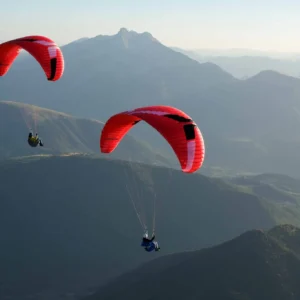




All of these refinements have improved flight characteristics and performance. The first thing you will notice is a more linear and direct response in the brakes and the resulting increase in agility and precision of handling. Top speed has also been increased, and glide performance improved throughout the accelerator range.speedriding
This category of wing is highly important to us as it serves such a wide range of pilots, and the Geo 7 is the most efficient wing we have ever produced in its “True B” class. It is designed for pilots who want a fun and capable XC wing with the best passive safety available at this level.speedriding
The G7’s internal structure is engineered for lightness and longevity, with an intelligent blend of durable 32g and 40g cloth. The main surfaces are comprised of Dominico N20D LE and N10D. It is 1.4kg lighter than the Buzz Z7 and 125g lighter than the Geo 6 without compromising strength or durability!speedriding
THE PILOT
The Geo 7 is aimed at pilots who fly 30 to 50 hours a year and who are looking for a lightweight wing for travel, hike & fly, and cross country flights with high levels of passive safety.
The Geo7 is available either with Linklites (the lightest option), or with conventional steel maillons which add around 100 grams to the total weight.
PRODUCT OPTIONS
The standard version of the Geo7 comes with black 12mm risers with steel maillons for ease of use. The light version is fitted with dyneema risers and linklite connectors for those looking to save weight.OZONE DELTA 4 Paraglider
Package Contents
Your OZONE wing is delivered standard with the following accessories:
Inner Bag, Riser Bag, Glider Strap, OZONE Stickers, Repair Cloth and OZONE Keyring.
You may choose to add something to your order, such as: Concerto Light Bag, Glider Backpack, Easy Bag (quick stuff sack) or OZONE Clothing and Accessories.
Materials
- Top Surface Cloth: Dominico N20D / Dominico N10D
- Bottom Surface Cloth: Dominico N10D
- Rib cloth: Dominico 20D_32 (hard) / Porcher 7000 E29 (hard)
- Upper lines: Edelrid 8001
- Mid lines: Edelrid 8001
- Lower Lines: Liros PPSL/Edelrid 8001
Downloads
Additional information
| Sizes | ML, MS, S, Large, XS |
|---|---|
| Colors | Custom, IWH\I, RWK\R, UAR\U, WAR/W |
Reviews
There are no reviews yet.
Related products
-
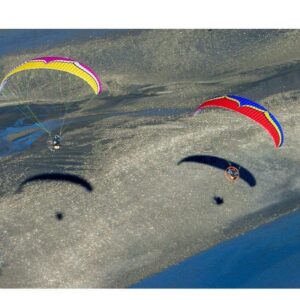
OZONE SPYDER 3 BEGINNER
£2,300.00Select options This product has multiple variants. The options may be chosen on the product pageAdd to WishlistAdd to Wishlist -

Ozone Magnum 4
£3,100.00Select options This product has multiple variants. The options may be chosen on the product pageAdd to WishlistAdd to Wishlist -
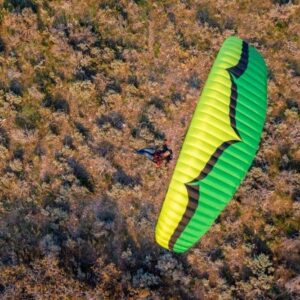
OZONE ZERO 3 Speed Wing
£1,500.00Select options This product has multiple variants. The options may be chosen on the product pageAdd to WishlistAdd to Wishlist -
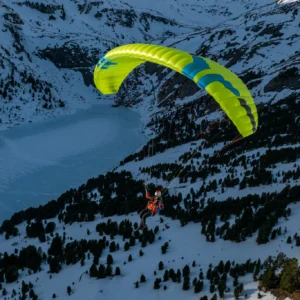
Ozone Ultralite 5
£1,800.00Select options This product has multiple variants. The options may be chosen on the product pageAdd to WishlistAdd to Wishlist
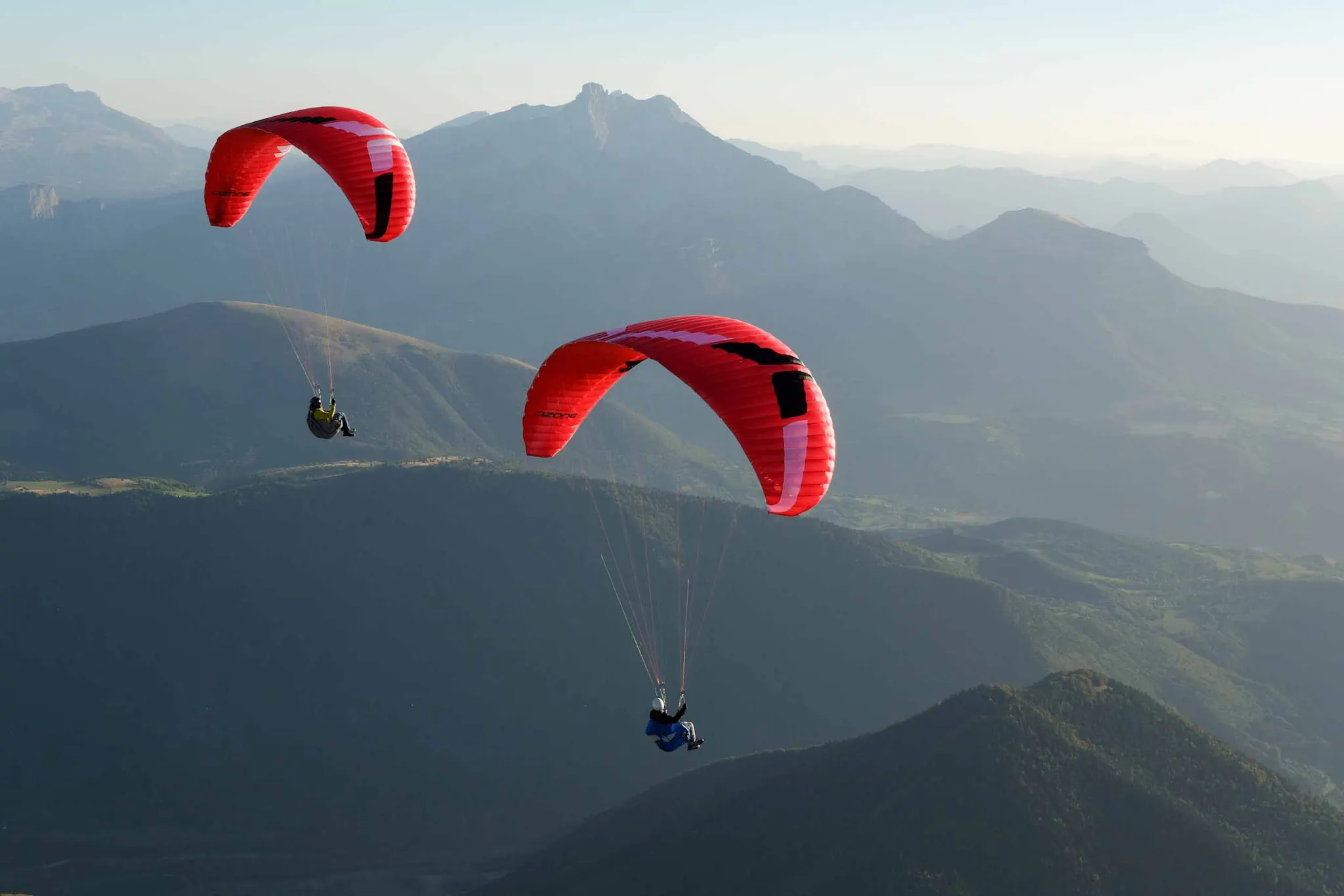
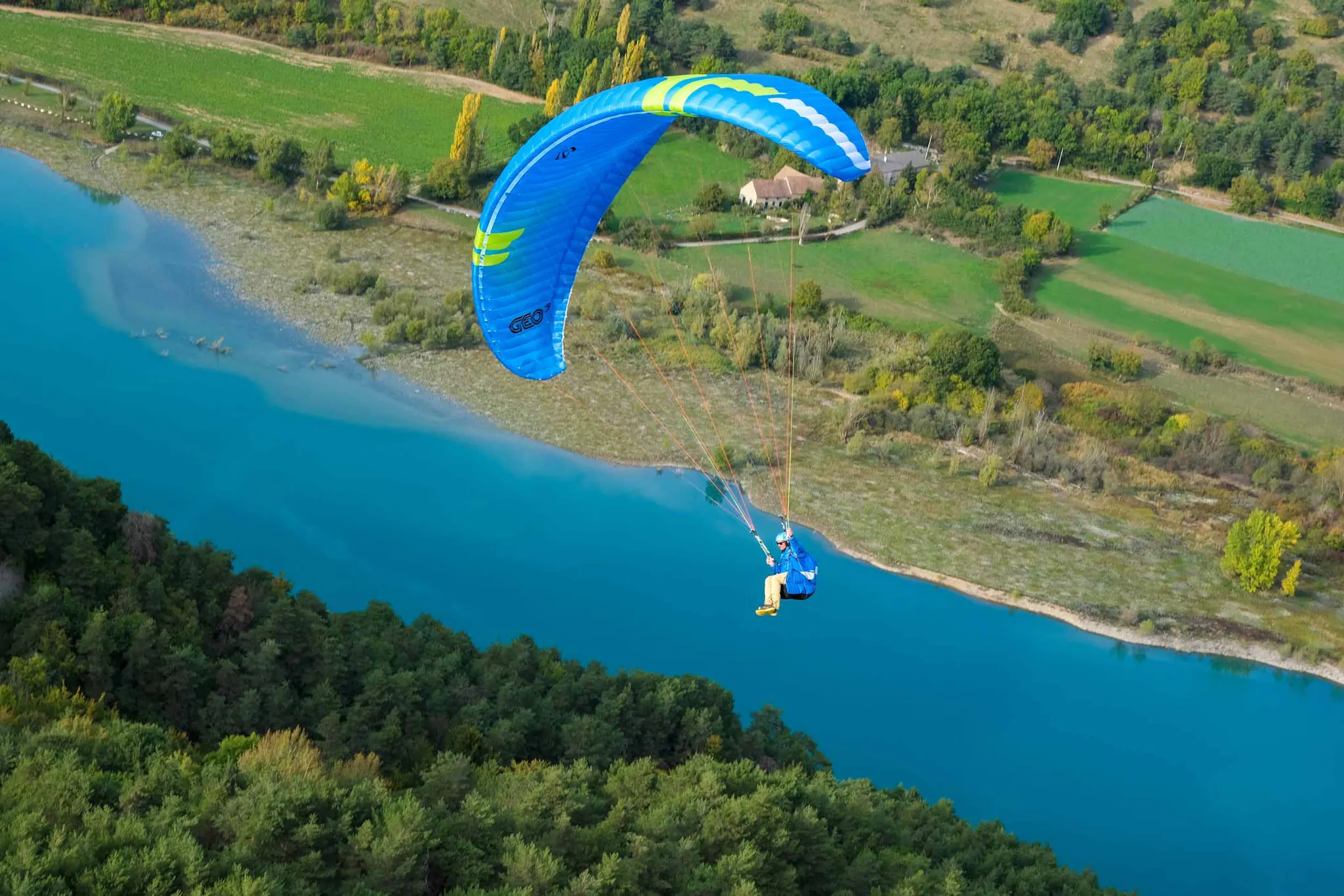
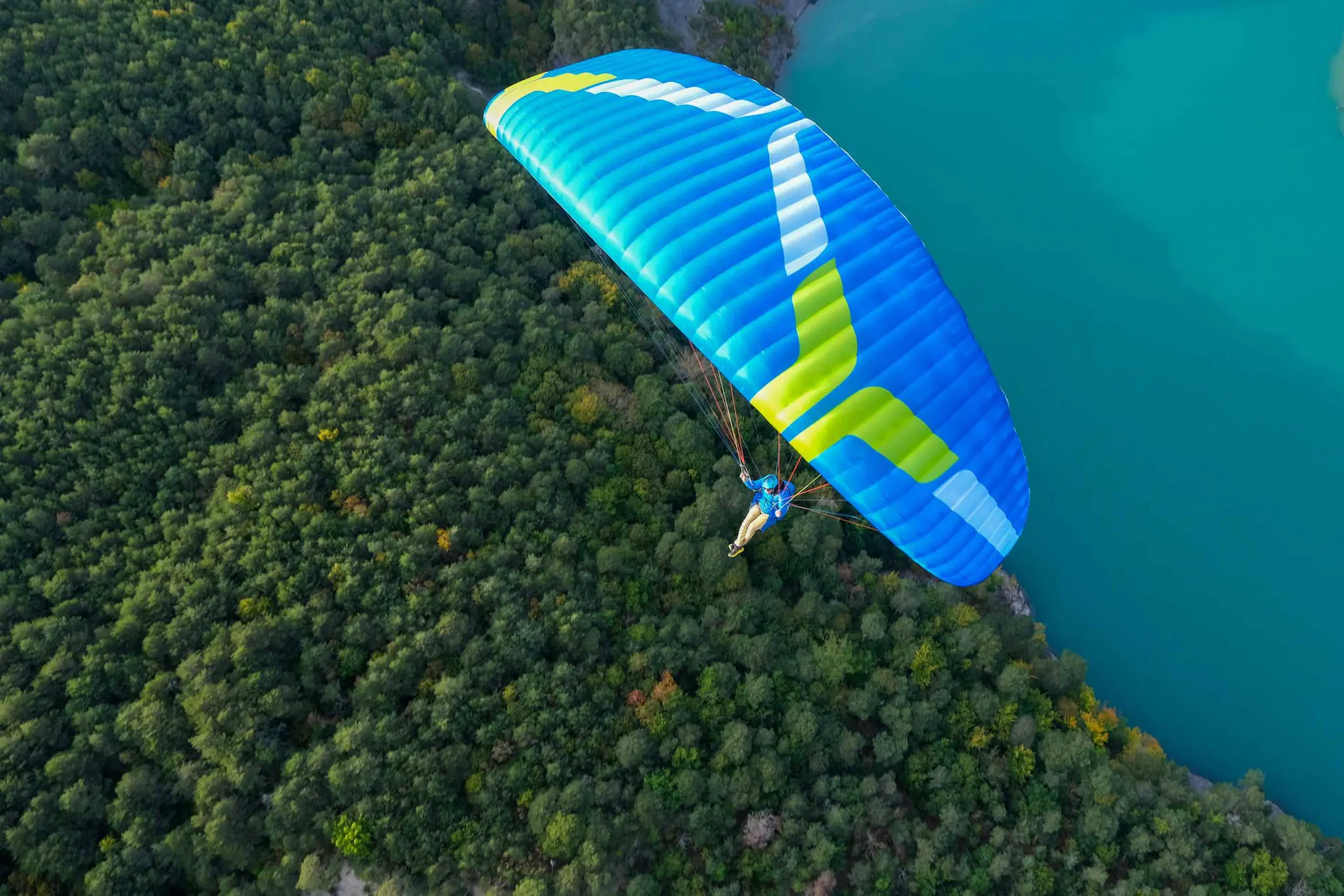
Use Guide for the OZONE GEO 7 Paraglider
Mastering the OZONE GEO 7 Paraglider involves more than just launching and landing—it’s about learning how to maximize its ultralight performance, care for the materials, and fly responsibly in a variety of terrain. This guide breaks it down step-by-step so you can fly safely, confidently, and efficiently from day one.
🪂 Before You Fly – Pre-Flight Checklist
1. Understand Your Wing
Before using the GEO 7, familiarize yourself with its EN B characteristics. While highly stable, it responds best when flown with precise and smooth inputs.
2. Pack Correctly
Always concertina pack your GEO 7 using a wing bag or dedicated folding bag. This prevents deformation of the leading edge and protects the rods.
3. Inspect Thoroughly
✅ Check fabric for rips or abrasions
✅ Inspect lines for knots, wear, or tangles
✅ Confirm riser and maillon security
✅ Verify brake lines are routed correctly
🪢 Setup and Layout in the Field
1. Choose Your Launch Site
Look for smooth terrain free from rocks or sharp objects
Avoid launching from areas with rotors or strong crosswinds
Ensure sufficient clear space in front for launch run
2. Wing Layout Steps
Place the GEO 7 nose into wind
Arrange lines symmetrically
Separate risers to prevent tangling
Ensure leading edge is gently inflated and cells open
🎈 Launching the GEO 7
Forward Launch
Ideal for light or nil wind
Hold A-risers and gently build pressure
Increase run speed gradually until wing lifts
Maintain symmetrical pressure on brakes for stability
Reverse Launch
Recommended in moderate to strong wind
Face the wing, pull A-risers upward
As it rises, turn smoothly and accelerate forward
Apply brakes gently to prevent overshooting
🌤️ In-Flight Behavior and Tips
1. Thermal Flying
The GEO 7 climbs efficiently with minimal brake input
Center thermals by weight-shifting and using smooth, even turns
Expect excellent pitch stability, making centering easier
2. Glide and Transition
For best glide: speed bar 30–50%
Avoid abrupt weight shift movements in active air
Monitor riser angles for airspeed awareness
3. Using Speed System
Push bar incrementally
In turbulence, return to trim before encountering sharp lift/sink
Combine with weight shift for optimal glide control
🪂 Landing the GEO 7
1. Setup Early
Plan your landing pattern (downwind, base, final)
Assess wind direction using windsocks, streamers, or natural indicators
2. Final Approach
Keep your legs bent and feet together
Focus 10–20 meters ahead—not directly at your feet
Flare gradually at 2–3 meters above ground
Finish with a smooth, symmetric brake pull to touch down softly
3. Post-Landing Care
Immediately collapse the wing
Check for damage if landing on rough surfaces
Loosely gather lines and risers to prevent tangles
🎒 Hike-and-Fly Use Tips
1. Use Lightweight Harness
Pairing the GEO 7 with a reversible or ultralight harness ensures maximum portability.
2. Pack for Balance
Keep heavier items (like your reserve or water) near your back’s center of gravity for stable hiking.little cloud paragliders
3. Hydration & Safety
Always carry:
Water (1–2 liters minimum)
Emergency GPS or phone
Lightweight wind/rain shell
Power bars or gels
🧼 Maintenance & Storage
Post-Flight Routine
Lay wing out to dry if exposed to moisture
Brush off dust or grass seeds from fabric
Avoid dragging wing across abrasive surfaces
Long-Term Storage
Store in a cool, dry environment
Avoid compression during storage—use concertina packing
Never leave exposed to direct sunlight for extended periods
💡little cloud paragliders Advanced Use Tips
For Cross-Country Flights
Use XC software (like XCTrack or FlySkyHy) for planning
Monitor cloud development—GEO 7 loves active thermals
Always fly with a reserve parachute, especially in remote areas
For Vol-Bivouac Adventures
Waterproof stuff sacks keep the wing safe in rainy bivy camps
GEO 7’s pack volume allows room for food and sleep gear
Fly early in the day when thermals are milder and landing zones more visible
🚫 What to Avoid with the GEO 7
❌ Don’t exceed certified weight range
❌ Avoid strong rotor zones or high-wind launches beyond your skill level
❌ Never pack when wet—this damages the fabric
❌ Don’t use aggressive brake input in active air—let the wing do the work
❌ Avoid steep or abrupt maneuvers outside EN B pilot limits
📚 Final Flight Notes
Flying the OZONE GEO 7 Paraglider is a liberating experience. With the right mindset, preparation, and safety awareness, you’ll discover a whole new world of flying possibilities.